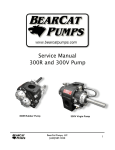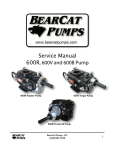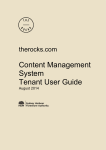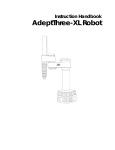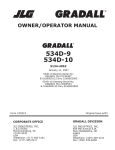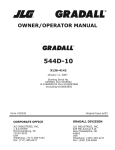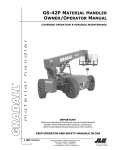Download 960 Pump Manual
Transcript
Service Manual 960 BearCat Pumps, LLC (623)587-1350 1 Table of Contents General Safety Precautions Overview 3 4 R Model Bearing Design Complete Rebuild Installation 5 Shaft Alignment System Piping Piping Strain Relief Valve 6 Relief Valve Setting Inspection or Removal: Start – Up Routine Maintenance 7 8 Bearing grease for ‘AR’ series pumps Shaft Seal Seal Replacement Procedure Trouble Shooting 9 No liquid delivered or the pump will not prime. Pump noisy when operating Model Number and Configuration Pump Dimensions Parts Diagram - 960 Pump Parts Diagram - 960 Full Mount Assembly Technical Data 10 11 12 13 14 Maximum Operating Limitations BearCat Pumps, LLC (623)587-1350 2 GENERAL SAFETY PRECAUTIONS • This manual should be read entirely prior to the commencement of installation and operation. • Only qualified personnel should install, operate and maintain this pump and associated equipment. • Check pump for specific safety warnings/labels. • Prior to start-up, ensure complete cleanliness and integrity of the system in which the pump is installed. • In most cases the relief valve is factory set during performance test. In cases where the duty is not known (such as distributors or stock orders) or where the components containing the relief valve come from pre-tested stock batches, it is not possible to factory set the relief valve, in this case it is the installers responsibility to set the relief valve in accordance with the specific application. • Pumps with heat tracing or jacketing necessary to prevent solidification of the product should be brought up to working temperature prior to start-up. • All electrical work must be done in accordance with the manufacturers recommended procedures by qualified personnel. • Ensure all guards are securely in place before operating the equipment. Do not remove guards at any time during operation. • For pumps operating under ‘flooded’ suction, when venting the pump through a plug or valve, care should be taken not to completely remove vent plugs or completely open any vent as this could result in liquid being discharged from the openings under pressure. • Prior to start-up, ensure that the system valves and associated equipment are correctly set. • Wear appropriate safety attire including long sleeves, face shield, and gloves, whenever starting or operating the pump. BearCat Pumps, LLC (623)587-1350 3 OVERVIEW The BearCat 960AR is an external gear, positive displacement pump designed specifically for rubberized and polymer modified asphalts. The bare pump (as shown in the picture to right) is a bearing design, with one of the key features being that it is completely rebuildable. The pump can fitted with heating blocks, relief valve, extended or short shafts, in order to fit the pump for a number of different applications. Applications include; the primary pump of an Asphalt/Rubber Distributor, Plant supply through a Micro Motion® Coriolis (Mass Flow) meter, transfer pump from an mix blender, or as an unloading pump. R Model Bearing Design The R model pumps most prominent feature is the Heavy Duty AR bearings. In abrasive/high viscosity materials, the bearings will significantly improve service life and predictability in the pump. Complete Rebuild Probably the best feature of the 960, is that it is completely rebuildable. To minimize downtime, the program is structured as a core exchange. In most cases, the rebuild pump is delivered to the customer prior to removing the old pump from service. A factory rebuilt pump is bored and sleeved. It receives new gears, shafts, bearings, end plates, seals and hardware. Contact the factory for more information about rebuilding a 960 pump. BearCat Pumps, LLC (623)587-1350 4 INSTALLATION Shaft Alignment In the case of a belt driven system, care should be taken to insure proper alignment and tension of the drive belts and pulleys. Insure that the belts and pulleys are free and clean from oil and debris. In the case of a direct drive system, proper care must be placed to insure that the coupled shafts are accurately aligned. Failure to do so may result in rapid seal and/or reduced pump life. System Piping Pump should be positioned as near as possible to source feeding it. Suction piping must be no smaller in diameter than the pump intake port and designed to avoid sharp bends, changes in sections or undue restrictions. Pressure drops due to an accumulation of valves, flex lines, etc. can be considerable and must be taken into consideration. Certain designs such as a low level drop are designed in order to maintain a minimum amount of liquid at the pump. After evacuating the lines, this remaining liquid can significantly improve start-up priming. Piping Strain To ensure undue forces are not present, flange bolts (suction and discharge) should be completely slackened. If flanges are observed to spring apart, twist or move out of parallel excessively, remedial action must be taken. The piping system can expand and contract considerably with the changes in temperature. Ensure that the final system allows for this change. Re-tighten All Bolts Once the pump reaches operating temperature, all flange connecting bolts should be tightened. At temperature, green gaskets will softened and cause the connection to loosen, retightening the bolts will prevent further leaks from developing. BearCat Pumps, LLC (623)587-1350 5 RELIEF VALVE Caution: A relief valve is necessary to protect the pump and system from potentially dangerous over-pressure. Relief Valve Setting BearCat Pumps are positive displacement pumps and must have some sort of pressure protection. This may be a relief valve mounted to the backside of the pump. The Pressure Relief Valve is made up of a plate that is held against a port by a spring. The spring tension can be adjusted for varying pressures. When the pressure exceeds the adjusted amount, it pushes the plate (Inner Poppet) back, allowing the liquid to back to the inlet side of the pump. The relief valve will operate in the event of a restriction in the discharge line or the inadvertent closure of a downstream valve. The valve must not be used as a flow control device. If the pump is supplied without an internal relief valve, a suitable external relief to the system must be supplied The internal relief valve will have been factory set. However, check for correct operation upon installation. Re-adjustment may be necessary due to viscosity variations. Inspection or Removal: It may become necessary to access the inside of the pressure relief valve. If the Relief Plate is removed for repairs, be sure to replace it in the proper orientation in relation to the outlet port. 1. Measure the Pressure adjuster bolt distance from back of the Cap to the end of the Adjuster Bolt before proceeding. 2. Release spring compression by loosening the Adjuster Lock Nut and Bolt. 3. Remove bolts securing the Adjuster Cap. Remove items 2-6. Clean and inspect. 4. Re-assemble in reverse order. 5. Set Adjuster Bolt to distance measurement established in step 1. (1) (2) (3) (4) (5) (6) (7) (8) (9) (10) RV Housing Inner Poppet Inner Spring Outer Spring Outer Poppet Cap Oring Adjuster Cap Bolt Oring Lock Nut Adjuster Bolt BearCat Pumps, LLC (623)587-1350 6 START – UP Caution: 1. Pump should turn freely by hand. Ensure all guards are in place. 2. If heating is necessary, turn on supply and allow pump temperature to stabilize. 3. If pump is below level of liquid is tank (flooded suction), open appropriate system valves gradually, and check for signs of leakage. Be sure all guards are in place, and all appropriate safety gear is worn prior to starting pump. During initial run, pump speed should be operated at minimum in order to insure all functions are normal, connections are leak free, and rotation is smooth. Cautiously increase to normal operating speed. 4. If pump is above the level of liquid in the tank (suction lift), prime the pump by pouring as much liquid possible in the strainer housing or adjacent piping – particularly on the suction side. 5. Check the pump rotation by flicking motor starter ‘on’ then ‘off’. (Correct rotation indicated by diagram on pump cover plate) 6. Start pump – check system for leaks BearCat Pumps, LLC (623)587-1350 7 ROUTINE MAINTENANCE Bearing grease for ‘AR’ series pumps For optimal service life in an AR model pump, the bearings need to be greased at the end of each day just after shut-down, but while the pump is still hot. Cold Asphalt Rubber (AR) is extremely tough on the bearings and castle nut assembly inside the pump. Grease with high temperature (Mystik JT-6). This will aide in lubricating the bearings and displacing/diluting the asphalt rubber prior to the next start-up. Shaft Seal After a period of time (based on pressure, operating procedures, material, etc) it will be necessary to change the shaft seal. This is a fairly easy procedure. If the pump is leaking more than a drop a minute, or any amount deemed unacceptable, insure the the a seal kit is on hand and follow the seal replacement procedure; Seal Replacement Procedure 1. Turn pump off completely. 2. Ensure that pump is isolated from system by closing suction and discharge valves. 3. Remove any guards, couplings, bearings, or companion flanges aft the dust seal (item 16). Remove the dust seal bracket (item 16) and use a flat head screw driver to pry out the old seal (item 15). 4. Clean the shaft surface and seal bore of any asphalt / debris. Inspect and remove any sharp burrs in the keyway and shaft body. Also inspect for grove worn into shaft by old seal. An excessively deep groove will require shaft replacement. 5. Clear plastic tape can be used to mask keyway prior to seal installation. Once the keyway is taped, lubricate with grease. Gently slide main seal (item 15) over shaft, and into seal bore. Install new dust seal bracket. 6. Replace guards, couplings etc. BearCat Pumps, LLC (623)587-1350 8 TROUBLE SHOOTING Under each fault symptom given below is a list of recommended inspections that could indicate the cause, most are elementary but are often overlooked. The best aid to fault finding in the pump is a vacuum gauge as close as possible to the pump inlet. This can readily indicate whether the imposed suction is within the pumps capability, or if there has been a dramatic change from the conditions, which will indicate a change in the viscosity of the pumping media, resulting in higher pressure loss in the suction line, or that a filter requires cleaning, etc. No liquid delivered or the pump will not prime. - Check Direction of shaft rotation. - Are suction line joints leaking in air? - Total suction condition, is there sufficient N.P.S.H. available? - Has the pump been properly primed before start-up? - Is suction port blocked? Is filter clean? - All valves in system are open? - Is the discharge line vented? Pressure build-up will ultimately prevent suction vacuum! - If the vacuum gauge is reading over 20inHG there is almost certainly a blockage in the suction. li - Is the material hot enough? EVERYWHERE? - If you have a screen box, add 3 gallons of suitable liquid to help establish prime. Pump noisy when operating - A low growling sound is normal for new pump. The noise is attributed to the meshing of the hardened gears. The pump will tend to be louder when turning empty and will quite down once liquid prime is established. - A loud clacking can be an indication that the pump is cavitating. Look for signs of inlet flow restrictions or lower than normal material temperature. As a last resort, slow pump speed until noise goes away. - Pump internals are worn. - Debris in material. Add screen box. - Misalignment of drive system. BearCat Pumps, LLC (623)587-1350 9 MODEL NUMBER AND CONFIGURATION BearCat Pumps, LLC (623)587-1350 10 PUMP DIMENSIONS 0.375 9.525 0.7495 19.04 1.499 38.07 Port Size Port size is a pump port. It is the equivalent bolt circle of a bolted directly to that using standard size gaskets and requirements, consult factory for and weld on BearCat Pumps, LLC (623)587-1350 ANSI 150# Pipe and can be For high performance for line size connections. 11 PARTS DIAGRAM - 960 PUMP To order specify model number (ex - 960PX) followed by item; (1) Housing (2) Gear Set (3) End Plate Gasket (4) Idler Shaft (5) Drive Shaft (6) End Plate (12) Cap Oring (13) Piston Bracket and Ring (14) Seal Housing (15) Shaft Seal (16) Dust Seal/Mount Bracket (17) Castle Nut/B. Wash/Pin (18) Bearing Continued (24) Port Gasket Packed Seal Assembly (20) Packed Housing (21) Packing Washer/7-Ring Set (22) Gland (2-pc) (23) Clips/Studs/Nuts/Washers BearCat Pumps, LLC (623)587-1350 Hardware items. (A) 3/8 Key stock 2” Lg (B) 1/2 Dowel pin 1-1/4” Lg (C) 1/2-13x1-1/2 Hex Head (D) 1/4-20x3/8 Socket Head (E) 3/8-16x1 Sq. Hd Set Screw (F) 3/8-16x1-1/2 Socket Head 12 PARTS DIAGRAM - 960 FULL MOUNT ASSEMBLY To order specify model configuration followed by item; (ex- 960PX - RS) (30) 960 Pump (31) Top Plate (32) Side Plate (33) RV Elbow (34) Foot Bracket (35) Support Bracket (37) Pillow Block Bearing (38) Bearing Support (41) Main Poppet (42) Outer Spring Continued (43) Top poppet (44) Oring, Adjuster Bolt (45) Lock Nut (46) Cap Oring (47) Inner Spring (48) (49) Return Cover BearCat Pumps, LLC (623)587-1350 Hardware items. (A) 3/8 Key stock 2” Lg (B) 1/2 Dowel pin 1-1/4” Lg (C) 1/2-13x1-1/2 Hex Head (D) 1/4-20x3/8 Socket Head (E) 3/8-16x1 Sq. Hd Set Screw (F) 3/8-16x1-1/2 Socket Head Heat Cell (51) (52) (53) (54) ½ FPT to #10 MB Straight #10 MB Plug #10 MB to #10MJ 90. Aluminum Heat Cell 13 TECHNICAL DATA Maximum Operating Limitations • Pressure: 100 PSI (7 BAR) • Speed: 500 RPM • Temperature: 500°F (260°C) Actual flow can be limited by any number of parameters. Line flow restrictions, viscosity, material type etc. The standard maximum RPM is based on ideal conditions. Please consult factory for high performance parameters exceeding standard specifications. Pump Graphs Flow Rate - GPM Flow Rate (GPM) 500 375 250 125 0 0 100 200 300 400 500 Pump Speed (RPM) 25 PSI 50 PSI 100 PSI Horse Power (Hp) Power (neglecting viscosity) 30 23 15 8 0 0 100 200 300 400 500 Pump Speed (RPM) BearCat Pumps, LLC (623)587-1350 14














